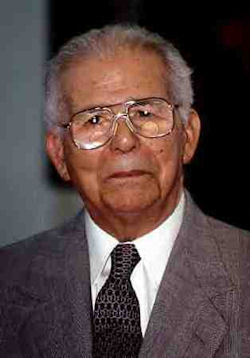Dominican Republic - Authoritarian Balaguer, 1966-78
 In his authoritarian and patrimonial style, predilection for grandiose public construction projects, and emphasis on the country's Hispanic essence, Balaguer resembled Trujillo. However, Balaguer's treatment of economic, military, and political power differed from that of the strongman under whom he had served, in part because of changes in Dominican society and international circumstances.
In his authoritarian and patrimonial style, predilection for grandiose public construction projects, and emphasis on the country's Hispanic essence, Balaguer resembled Trujillo. However, Balaguer's treatment of economic, military, and political power differed from that of the strongman under whom he had served, in part because of changes in Dominican society and international circumstances.
The Balaguer period from 1966 to 1978 was one of high economic growth; the country averaged a 7.6 percent increase in real GDP over the period. Growth was based on increased export earnings, import-substitution in consumer goods promoted by generous tax incentives, and public investment projects. It was facilitated by the United States sugar quota and generous economic assistance, particularly in the early Balaguer years. Balaguer ruled in a patrimonial fashion, ensuring that he was the central axis around which all other major political and economic forces revolved. At the same time, he eventually undermined his position by promoting the development of business groups separate from, even if dependent upon, the state. Such an approach sharply contrasted with the approach taken in the Trujillo period. However, organized labor remained extremely weak as a result of repression, co-optation, and very restrictive labor legislation.
Relations between business and Balaguer were complicated by the growing incursions of the armed forces into business and into politics. Balaguer had a commanding presence within the military as a result of his ties to the Trujillo period, his anticommunism, his statesmanlike caudillo figure, and his acceptance of military repression as well as large-scale corruption.
However, he clearly was not the military figure Trujillo had been. He sought to manage the military by playing off the ambitions of the leading generals and shifting their assigned posts. Yet, he occasionally confronted serious challenges, such as a coup effort by EHas Wessin y Wessin in 1971, which he successfully dismantled. The two leaders were later to reconcile politically.
The initial Balaguer years were a period of relative polarization that saw government repression and sporadic terrorist activities by opposition groups. In a six-year period after the 1965 occupation, some 2,000 additional Dominicans were killed. Following his electoral victory in 1966, Balaguer ran again and won in elections in 1970 and 1974. However, in these elections, the military placed strong pressure on opposition candidates, most ofwhom ultimately withdrew prior to election day. Balaguer also practiced a policy of co-optation, bringing opposition figures into government. The extent and the severity of repression, particularly after 1976, were considerably less than in the Trujillo years.
By the 1978 elections, Balaguer's drive for power, re-electionist aspirations, and policy decisions had alienated a number of his former supporters. His popularity was also affected by worsening economic conditions. An economic downturn finally affected the country around 1976, when the sugar boom that had offset oil price increases faded. In addition, the country's substantial growth, industrialization, and urbanization had expanded middle-sector and professional groups, which were disgruntled by Balaguer's method of rule and apparent discrimination against newer and regional groups. The PRD, feeling the mood of the population and sensing support from the administration of United States presidentJimmy Carter, nominated a moderate, Silvestre Antonio Guzman Fernandez, as its candidate to oppose Balaguer in the 1978 elections.
For these elections, the PRD also projected a more moderate image and strengthened its international contacts, particularly with the United States government and the Socialist International. The PRD's ability to project itself as a less threatening alternative to Balaguer in 1978 was facilitated by the decision of Bosch in 1973 to abandon his party and establish another, more radical and cadre-oriented party, the Party of Dominican Liberation (Partido de la Liberacion Dominicana PLD). Bosch's exit followed upon his disillusionment with liberal democracy following the 1965 United States intervention. In the 1980s, however, he was to lead his party back into the electoral arena.
Electoral victory did not come easily for the PRD. As it became evident early in the morning after election day that the party was winning by a wide margin, a military contingent stopped the vote count. In the end, the effort to thwart the elections was dismantled because of firm opposition by the Carter administration, other Latin American and European governments, and domestic groups. Yet, in the tense period between the election and the inauguration, congressional electoral results were "adjusted" to provide the exiting Balaguer with a guarantee that he would not be prosecuted. Principally this adjustment involved giving Balaguer's party, the PR, a majority in the Senate, which appointed judges, and thus was key to the successful prosecution of corruption charges.
|
NEWSLETTER
|
| Join the GlobalSecurity.org mailing list |
|
|
|

